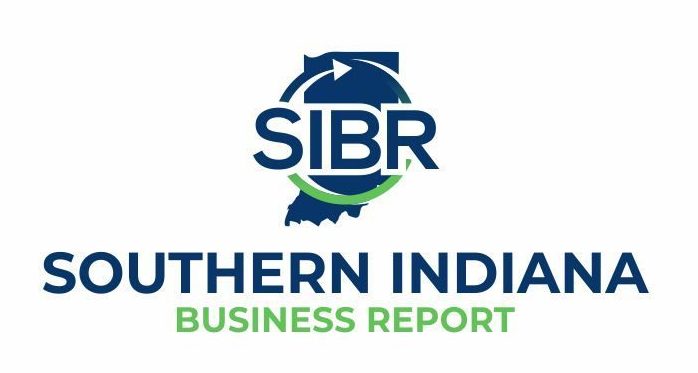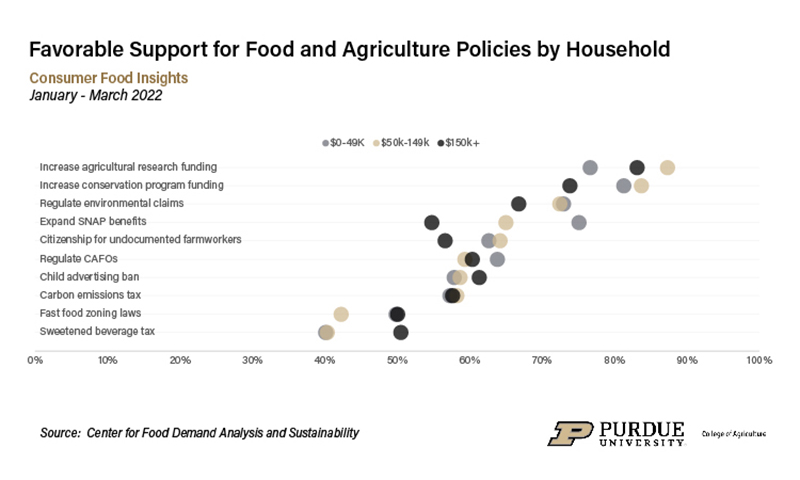By Elizabeth K. Gardner| Purdue University
West Lafayette — As the U.S. House Committee on Agriculture reviews the Farm Bill, consumers shared their opinions on food and agriculture policy in a new survey. The third Consumer Food Insights Report from Purdue University offers insights into the popularity of specific policies and how opinions differ depending on a consumer’s income.
Increased funding for research to create crops more resistant to heat drought and flooding, and conservation programs to pay farmers and ranchers to adopt climate-smart practices were the most popular policies included, with more than 80% of the consumers in support. In addition, 63% of the respondents agreed that climate change will influence food prices.
Food safety and inspection ranked as the most important USDA budget category.
The survey-based report out of Purdue’s Center for Food Demand Analysis and Sustainability assesses food security and spending, consumer satisfaction and values, support of agricultural and food policies and trust in information sources.
Additional key results from the March survey include:
- The Sustainable Food Purchasing (SFP) Index remained at 68/100.
- Share of households experiencing very low food security rose to 9.7%.
- Inability to find specific foods at the store decreased to 21%.
- Total food spending increased by 8%.
- 16% of spending on food away from home went to delivery.
- At present, consumer food demand is price insensitive.
The March survey added an examination of differences in responses across low-, middle- and high-income brackets. The results showed differences in support of policies like SNAP benefits and a sweetened beverage tax, as well as in self-assessment of sustainable food purchasing.
“The survey results show that income is a big driver of food preferences and buying behavior,” said Jayson Lusk, head and Distinguished Professor of Agricultural Economics at Purdue, who leads the center. “Lower income consumers spend a larger share of the their income on food, place greater weight on food affordability, are more likely to choose generic over branded products, and are overall less happy with their diets than higher-income consumers. As a result, policies that increase the price of food have a disproportionate impact on lower-income households.”
Another interesting policy-related result was broad support for the regulation of environmental claims that food companies can make, he said.
“Consumers may be confused by or have difficulty navigating the current food sustainability advertising landscape,” Lusk said. “Seventy percent of respondents supported new regulations on what companies can say about their products.”
The survey results showed large majorities support individual policies that could improve food system outcomes, such as funding more agricultural research or regulating confined animal feeding operations, said Sam Polson, a food and agriculture survey scientist for the center and co-author of the report.
“However, from a policymaking perspective, there is an increasing congressional focus on large omnibus legislation, and the public opinion data on these bills tend to be less clear,” he said. “It is difficult to say that the popularity of a policy like expanding pandemic-related SNAP benefits would hold when attached to other policy objectives. Our results also reaffirm conventional wisdom in policymaking: Spending less rarely makes for popular policy. People are much more likely to support the status quo or favor increased federal spending.”
The Sustainable Food Purchasing Index (SFP) value for March remained the same as February at 68/100. The score reflects consumer food purchasing that aligns with a set of key recommendations for healthy diets from sustainable food systems. The index includes six components correlating with different strategies for achieving food system transformation: nutrition, environment, social, economic, security and taste.
Higher-income consumers tended to rate the sustainability of their diets as higher than did lower-income consumers, particularly on dimensions related to taste, security, economics and nutrition. By contrast, there were very little difference in high vs. low income on sustainability dimensions related to social and environment, Lusk said. He further discusses the report in his blog. Video of Lusk explaining the report is available at https://youtu.be/-ooGewOQ2EA.
The Center for Food Demand Analysis and Sustainability is part of Purdue’s Next Moves in agriculture and food systems, and seeks to use innovative data analysis shared through user-friendly platforms to improve the food system. In addition to the Consumer Food Insights Report, the center offers a portfolio of online dashboards.




